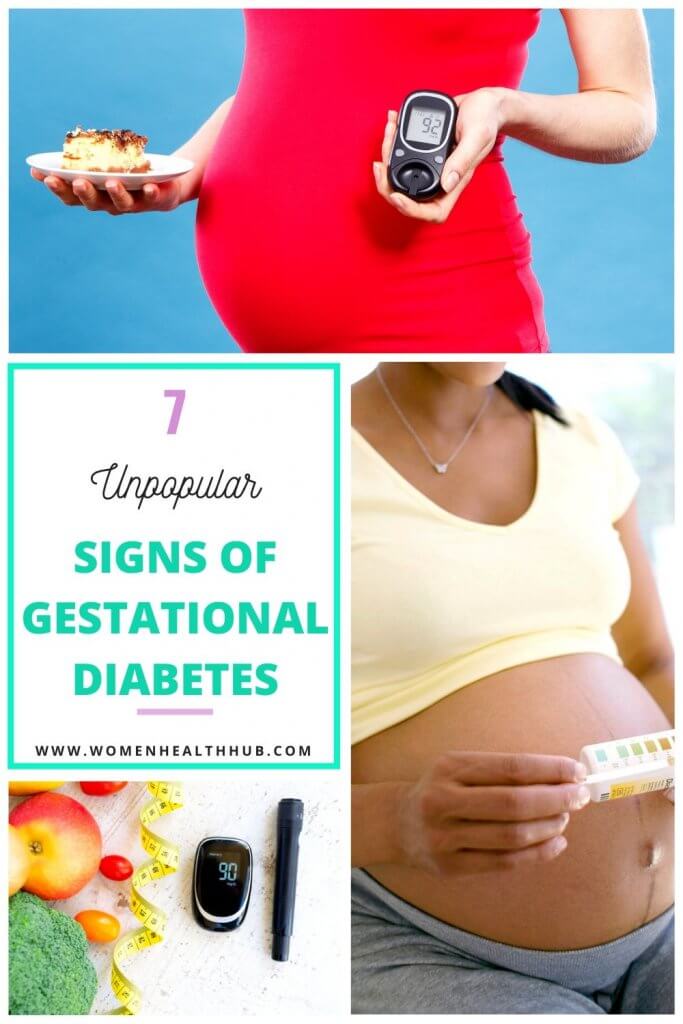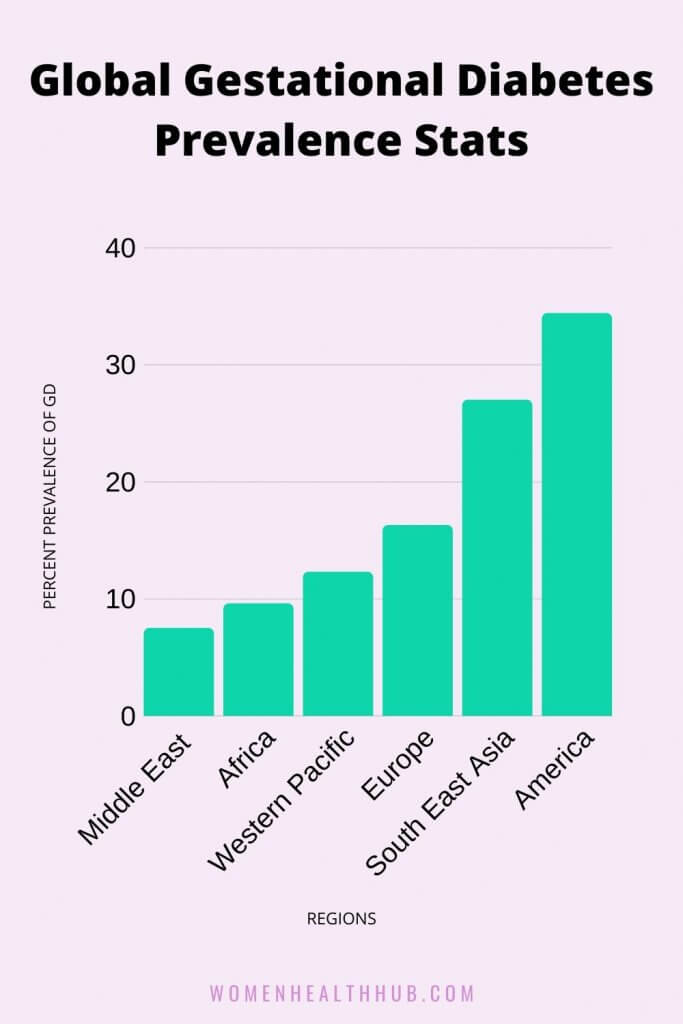Hey there! This post may contain affiliate links. As an Amazon Associate, I earn a teensy commission from qualifying purchases when you buy through these links (at no additional cost to you). For more info, please check the full disclaimer.
Most pregnant women often fail to notice the early warning signs of gestational diabetes. As a result, they may risk their own or the baby’s health.
Yes, diabetes in pregnancy could be dangerous for a baby.
High blood sugar disease poses numerous health risks for women. But during pregnancy, it even leads to birth defects in severe cases.
This blog post offers in-depth info on 7 lesser-known symptoms of gestational diabetes and what you can do to avoid them.
Let’s get started.
What is Gestational Diabetes?
Any term with the word “gestational” refers to pregnancy. Thus, gestational diabetes occurs during pregnancy.
Diabetes is a condition that affects insulin production in the body. Insulin is a hormone that’s responsible for absorbing glucose or sugar from the blood and transferring it to the cells for energy generation.
Because of various factors affecting insulin production, some mommies-to-be may experience abnormal blood glucose levels. This condition is known as gestational diabetes.
Gestational diabetes is of two types:
A) Hypoglycemia: This occurs when the blood sugar levels plummet, and your body doesn’t produce enough energy to perform properly.
B) Hyperglycemia: In this case, the blood glucose levels are too high, mainly because of low production or improper function of insulin.
When Does Gestational Diabetes Occur?
Before you learn about the vital signs of gestational diabetes, you should also know when exactly could you develop this condition in pregnancy.
Most women experience early warning symptoms of gestational diabetes in the late second or early third trimester.
You don’t necessarily have to be a prediabetic (someone with pre-existing diabetes symptoms) or have a family history of this disease.
Which brings us to the next question – how common is gestational diabetes during pregnancy?

How Common is Gestational Diabetes?
Per my research, the numbers vary from country to country, but it is a global problem.
Research shows that even though 18% of pregnant women may experience gestational diabetes, only 7% face any actual birth complications. Most women attempt to manage high glucose levels naturally by modifying their lifestyle.
Here are a few related statistics that might interest you.
- In the US, gestational diabetes cases increased by 3.6% from 2006 to 2016.
- This condition affects ethnic women more than white women.
- Per 2016 statistics, 11% of pregnancies had diabetic signs in South and Central America.
- 2018 stats revealed that each year 2 to 10% of pregnancies were affected by diabetes.
- 50% of women with gestational diabetes develop type 2 diabetes within the next two decades.
- In 2019, every sixth birth suffered from gestational diabetes.
- Globally, high blood sugar disease affects 6 to 13 % of pregnancies.
I’ve also explained the global prevalence of gestational diabetes in 2019 in the chart below.

What are the Causes of Gestational Diabetes?
Besides knowing about the scary gestational diabetes signs during different trimesters, you should also know what triggers this disease.
While pregnant, your body undergoes various hormonal changes.
A 2016 research explains that during pregnancy, many diabetic hormones are produced in your body, including placental hormone, progesterone, and cortisol.
These changes affect insulin production and its mechanism, quickly leading to high blood sugar levels.
Some other risk factors that may be the causes of gestational diabetes are:
- Obesity or overweight
- Family history of diabetes
- Polycystic ovary syndrome
- Improper nutrition or diet
- Stress
- Race or ethnicity
- Overexertion during pregnancy
- Lack of physical activity
Read More: 14 Early Warning Signs of Diabetes in Women
Is Gestational Diabetes Dangerous for the Baby?
The biggest question is: how dangerous is gestational diabetes for your baby?
Untreated diabetes can be risky for both you and your baby’s health. Consistently high blood sugar may potentially lead to the following health risks:
- Stillbirth
- Genetically inheriting diabetes type 2
- Early delivery
- Preeclampsia
- Birth by c-section
- Death of infant
- Developmental defects in the baby
- High blood pressure in mother
- Low blood sugar right after birth
- Abnormally large baby
This is exactly why it’s necessary for mommies-to-be to know what are the common vital symptoms of gestational diabetes that often get overlooked.
How Is Gestational Diabetes Diagnosed?
Most probably your doctor will conduct periodic blood tests to determine whether or not things are okay. If you have diabetes, it’ll come up in these tests.
However, here are a few other ways you can find out if you have high blood sugar levels in pregnancy.
a) Glucose test:
The most popular gestational diabetes test is the Oral Glucose Tolerance Test (OGTT). Doctors compare your blood sugar before and after consuming a sugary mixture. This helps them identify whether your body is absorbing sugar or not.
b) Visit your doctor:
Another precautionary measure is to visit your doctor between the 24th and 28th week of your pregnancy and ask for a diabetes test recommendation to put your mind at ease.
c) Buy a glucose monitoring device:
If you notice any early serious signs of gestational diabetes, the best thing to do is to confirm using a diabetes testing device.
Read More: Top 6 Best Budget Blood Glucose Monitors
d) Look out for red flags:
Diabetes doesn’t happen overnight. You might experience several subtle symptoms of gestational diabetes over the months, indicating high sugar levels.
Let’s go through the 7 most common gestational diabetes signs in pregnancy.
What are the Symptoms of Gestational Diabetes?

It’s often difficult to recognize the different signs of high blood sugar during pregnancy because they are too subtle to notice.
However, this list of gestational diabetes symptoms will help you look for certain often-missed signs in pregnancy.
1. Feeling Unnecessarily Thirsty
One of the most common warning symptoms of diabetes in pregnancy is excessive thirst.
During pregnancy, your blood volume rises, and you need more water for amniotic fluid (the protective layer inside the womb that cushions the baby).
Also, pregnancy raises body temperature and makes you sweat. Owing to these factors, Dr. Donald Grant, a general physician in the UK, says it’s common to feel thirsty if you’re carrying a little one.
So when is it a cause for concern?
If your thirst is insatiable — to the point where no matter how many bottles you down, you’re still thirsty. Then it’s a sign of gestational diabetes.
As a rule of thumb, pregnant women should drink between 8 to 10 glasses of water daily.
So if you need more, you might want to get your blood sugar levels checked.
2. Frequent Heavy Urination
Another unusual symptom of gestational diabetes in pregnancy is that you’ll start peeing heavily.
As mentioned before, you must drink sufficient water during pregnancy to avoid dehydration. After all, you’re drinking for 2 (or more)!
As a result, it’s natural to have a frequent need to pee.
But if you experience heavy urination, which is considerably different from the light flow during the early weeks of pregnancy, it’s an alarming sitch!
If you experience any such signs of gestational diabetes, immediately visit your doctor.
3. Extreme Fatigue
It’s important to understand that, medically speaking, fatigue and tiredness are two different terms. Unfortunately, most of us confuse them. So I’ll clarify the difference first.
Tiredness is common and can happen to anyone. You may feel tired after doing laundry for an hour. You rest for a while and feel A-okay again.
Fatigue, on the other hand, is more like persistent tiredness. One that doesn’t get better even after resting or having a good night’s sleep. You feel fatigued daily, often right after waking up, and experience a severe lack of energy.
Now coming back to this warning symptom of gestational diabetes.
High glucose levels can leave you feeling significantly lethargic. You might feel necessarily sleepy or drowsy for no apparent reason.
If this happens, visit your doctor so they can identify if you have gestational diabetes or not.
4. Previous Pregnancies with Diabetes
If you’ve had any previous pregnancies with signs of diabetes, you may be at high risk of getting it again.
A study in Diabetes Care shows that up to 69% of women with a history of gestational diabetes may suffer a recurrence in subsequent pregnancies.
The same research also reveals that if you needed insulin to regulate your blood sugar in a previous pregnancy, the same could happen again.
So what does this mean for you?
Be mindful of your medical history and take care during your next pregnancies. Make sure to check your blood sugar levels now and then. Stay alert and notice any subtle early signs of gestational diabetes in your body.
5. Increased Risk of Infections
Perhaps the most awful symptom of gestational diabetes is that you might experience frequent pregnancy infections.
And I’m not referring to mild infections like flu.
I’m talking about serious stuff such as Candida, a yeast infection that affects the vagina. Sadly, almost 75% of women suffer from Candida at least once, per a 2016 study.
Many studies link high risk of yeast infection to uncontrolled blood sugar levels.
Diabetes weakens your immune system and provides a clear path for the invasion of germs. Yeast infection in pregnancy causes immense pain, dryness, curd-like vaginal discharge, and pain during intercourse.
Additionally, as you’re frequently thirsty during pregnancy, the dehydrated body can further facilitate yeast infections.
If you keep having thrush or yeast infections during pregnancy, you may want to get your blood sugar checked, as it could be a warning symptom of gestational diabetes.
Read More: 9 Best Pregnancy Yeast Infection Treatments
6. Excessive Hunger Pangs
The truth is that most pregnant women with blood glucose disease don’t often pay proper attention to their diet.
Instead of eating a proper nutritious diet, we often cave in and indulge in our junk food cravings. As a result, not only the blood sugar rises, but the weight increases as well, which also promotes pregnancy diabetes.
But if you eat a healthy meal and still feel super hungry, it may be a scary sign of gestational diabetes. This disease enhances your appetite and compels you to eat unhealthy snacks.
So having adequate breakfast, lunch, and dinner is advised daily. Ensure you’re getting enough fruits, vegetables, and proteins to help keep the hunger pangs at bay.
7. Prediabetes Diagnosis
Last but not least, if you’re prediabetic, it’s a clear symptom of gestational diabetes danger in pregnancy.
Prediabetes is a condition in which your blood glucose levels are higher than normal and may develop into diabetes later on.
So if you get pregnant, there’s a heavy chance of developing diabetes during pregnancy at some point. Take special care of your diet and lifestyle while you’re pregnant.
Read More: Everything You Need to Know About Diabetes in Women
How to Manage Diabetes During Pregnancy
At this point, you might be wondering how to treat gestational diabetes.
Diabetic symptoms can be managed easily by making a few lifestyle changes. According to a 2010 research published in the International Journal of Women’s Health, the common advice to manage diabetic symptoms during pregnancy is medical nutrition therapy.
In other words, you have to be mindful of calorie intake and opt for less sugary or fatty foods.
You may have noticed that most of the signs of gestational diabetes I mentioned above, conflict with the changes happening in your body at the time.
For example, pregnancy might trigger certain food cravings, impacting your blood sugar levels. This naturally puts you in a tricky spot. Decisions, decisions, amirite?
So while you may want to entertain your needs during pregnancy (which you should), I also suggest following regular activities to curb the harmful effects.
Start by setting short milestones for your wellbeing. Don’t overexert your body. For starters, a regular prenatal yoga routine could be a good practice, don’t you think?
Here are some popular ways you can manage gestational diabetes naturally:
- Monitoring your glucose regularly
- Normalizing the blood pressure
- Manage your weight
- Take medications to regulate sugar
- Daily physical activity such as prenatal yoga or exercises
I hope this article proves to be a helpful resource, and you gained sufficient info on various signs of gestational diabetes that are common among women.
Please do let me know your thoughts + questions in the comments below. Also, share your experience with gestational diabetes and how it affected your pregnancy journey.
References:
- https://www.cdc.gov/diabetes/basics/gestational.html
- https://www.idf.org/our-activities/care-prevention/gdm
- https://diabetes.diabetesjournals.org/content/67/Supplement_1/121-OR
- https://www.diabetes.co.uk/diabetes-complications/diabetes-and-yeast-infections.html










29 comments
Wow, such an informative and comprehensive post! This will be very helpful to moms-to-be. Great job!
Thanks so much! 🙂
Wow I had no idea about most of these! Thank you so much for all the great information and for sharing this with all of us!
You’re welcome Krysten 🙂
I’ll share this with my pregnant friend. She needs to read this.
That’d be awesome! 🙂
Sounds scary. I was OK with my first pregnancy. I hope it will be the same if we wil decide for second. But it’s really important to know those 7 signs
Yes, good to know this stuff just to be on the safe side.
I am not surprised that America has more cases than the rest of the world. We are not the most nutritious country in many ways.
Sadly, economically deprived countries are no better. Diabetes during pregnancy can happen to anyone who neglects healthy lifestyle.
Wow! There is important information here. I didn’t even know about this during my two pregnancies. I am sure my doctor had an eye on it if signs presented themselves. Thank you for sharing, because even though I am done having kiddos, I know people who are not!
Yeah, doctors usually keep a check on this stuff. But knowing such facts make you more careful about your health, especially in pregnancy. 🙂
wow. this is a very comprehensive post. a lot of people are diabetic. and this is the first time i heard about gestational diabetes. it’s good that you really pointed out here the signs and symptoms, and the risks as well so people who are much more prone to this are aware. thanks for the information!
You’re welcome! Glad you found it helpful 🙂
Good to know for both my partner and I!
Awesome! 🙂
I grew up with a diabetic father and have had the warning signs drilled into my head (as there is a risk of it being something that runs in the family). That being said, I had no idea that hunger pains could be a sign – that’s a new one to me!
Yes, hunger pangs are common during pregnancy, but if too much of anything can be an alarming sign.
This is a very informational post that will be helpful to pregnant women. It must be so scary to get this diagnosis.
Yes, Kim. Women often get stressed after hearing the word “diabetes” but the good thing is that it’s reversible. 🙂
You’ve given your reader lots of great information here. Some of those red flags can certainly go unnoticed because we would expect to have more frequent urination and more hunger.
Exactly, Cris. These signs are common throughout pregnancy, quite easy to ignore them if you don’t know what they might mean.
Pregnancy is tough as it is. No woman would like to complicate it with diabetes. Your post will help all pregnant women look out for the symptoms of gestational diabetes. Thank you for sharing.
Thanks so much! You’re so right, it’s important to know about these signs so you can protect you and your baby from further complications.
I’m glad I didn’t have this when I was pregnant. I will share this with a pregnant friend.
Thank you, really appreciate it!
Diabetes is a very deadly disease. Too many people don’t know the risk of this and don’t care about the lifestyle they live by not giving priority to their health. Thanks for sharing.
You’re so right! Diabetes is a deadly disease.
I was tested during my pregnancies and thankfully didn’t have gestational diabetes. It’s so handy to know the signs though as I wouldn’t have known.